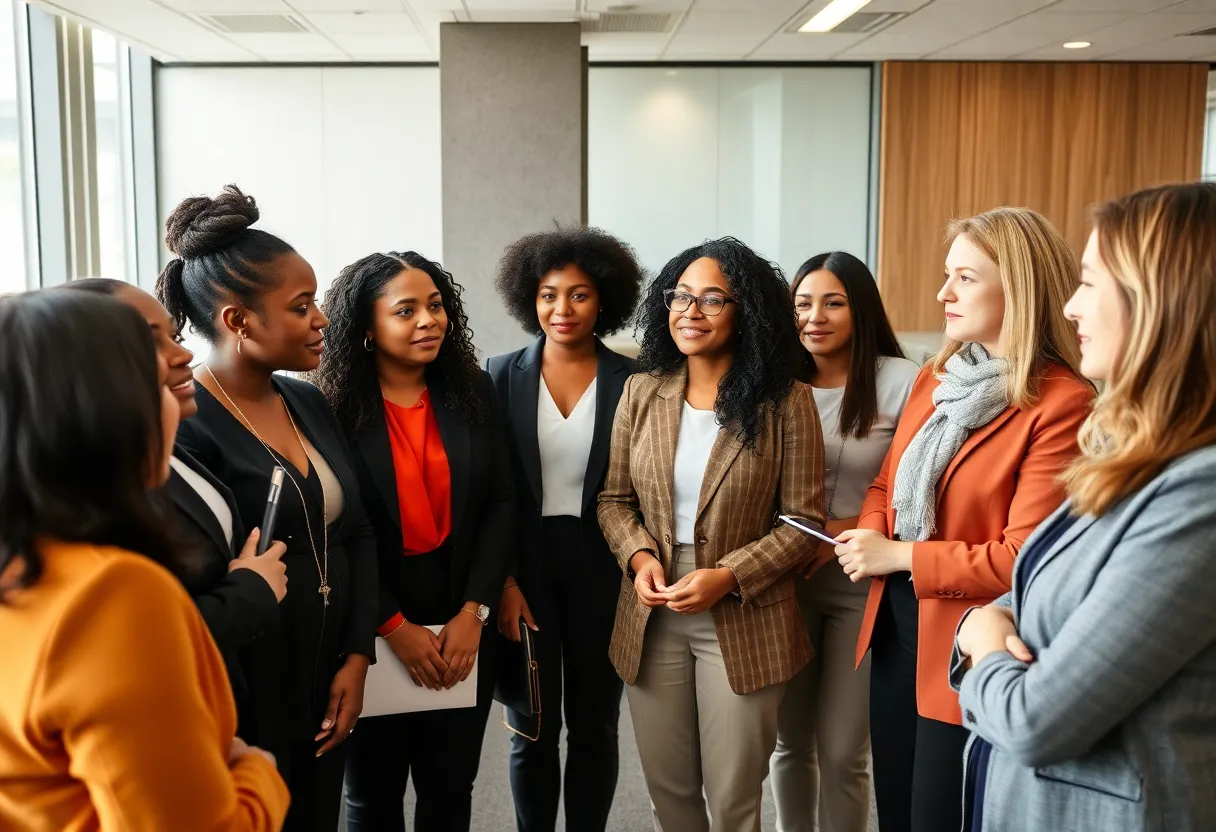Boston, September 30, 2025
News Summary
The unemployment rate for Black women has risen to 6.7%, surpassing the national average of 4.3%. A significant number of Black women, over 300,000, left the workforce between February and April, prompting concerns among community leaders and advocates. Factors contributing to this rise include corporate layoffs, a reduction in DEI initiatives, and economic pressures impacting small businesses. Community organizations are stepping up with programs to support affected individuals, while policymakers call for targeted federal analysis to address the crisis.
Boston
Black women’s unemployment rate rises as national job market shows little change
Unemployment rate for Black women has increased to 6.7%, outpacing the national jobless rate as the U.S. labor market shows modest movement. Overall unemployment rate in the U.S. is 4.3%, with little change over the past year. During a concentrated period in 2025, over 300,000 Black women left the workforce between February and April 2025, raising concerns among advocates, policymakers and community organizations about widening disparities.
Immediate causes and workforce shifts
Data and community leaders identify several forces behind the rise in unemployment for Black women. A notable pullback from corporate Diversity, Equity and Inclusion (DEI) initiatives has reduced roles and support structures that disproportionately benefited Black women in management and professional pipelines. Corporate layoffs, including cuts in the private sector and reductions at smaller firms, have also played a role.
Layoffs in the federal government are a contributing factor because a larger share of Black women are employed in government positions relative to some private-sector industries. Small business contractions linked to tariff-driven cost pressures have further limited job openings in sectors where Black women are often employed.
Individual and organizational impacts
A highly educated Black professional who worked as a Director of Diversity and Inclusion for a global firm was laid off in April and reported anxiety about uncertain finances and future employment prospects. Community-based organizations and local networks report both increased inquiries from job seekers and higher demand for career support services.
YW Boston has reported that corporate layoffs are contributing to the decrease in employment for Black women and is implementing programs intended to address emerging needs. YW Boston is implementing several initiatives to address challenges faced by Black women in the workplace, including webinars and advocacy training. Boston While Black is developing professional networking and job-sharing options to expand informal hiring channels. Boston While Black is creating networking opportunities for Black professionals and emphasizing job-sharing through its app.
Policy response and calls for data
At the federal level, a member of Congress has called for a focused federal analysis and an actionable plan to address the trend. Rep. Ayanna Pressley is advocating for the Federal Reserve to analyze data on the Black women’s unemployment crisis and responds with an actionable plan. As of the latest reports, Rep. Pressley’s office has not yet received a response from the Federal Reserve regarding her concerns. Advocates argue that clearer, disaggregated labor data on Black women could inform targeted job programs and support measures.
Community programs and longer-term planning
Local groups are responding with a combination of immediate supports and long-term leadership development. YW Boston plans a leadership program for women of color in 2026 aimed at elevating voice and influence within workplaces. Community organizations are expanding webinars, advocacy training, and networking to help displaced workers access jobs, negotiate workplace accommodations, and share best practices.
Leaders working with these organizations stress the importance of aligning DEI work with overall organizational effectiveness so firms can better navigate economic, social and technological change while retaining diverse talent.
Economic outlook and risks
While the national unemployment rate remains relatively steady, analysts and community leaders warn that the recent trends could foreshadow broader economic stress, especially for marginalized groups. Concerns about a potential recession have heightened focus on how downturns disproportionately affect Black women and other workers of color, who may have fewer buffers against job loss and less access to rapid re-employment.
What happens next
Policymakers, employers and community organizations indicate they will monitor disaggregated labor data and pursue programs intended to stabilize employment for Black women. Continued tracking of workforce participation and targeted interventions from both the public and nonprofit sectors are expected to shape short-term responses and longer-term workforce development.
FAQ
Q: What is the current overall U.S. unemployment rate?
A: Overall unemployment rate in the U.S. is 4.3%, with little change over the past year.
Q: What is the unemployment rate for Black women?
A: Unemployment rate for Black women has increased to 6.7%.
Q: How many Black women recently left the workforce?
A: Over 300,000 Black women left the workforce between February and April 2025.
Q: What federal action has been requested and what response has been received?
A: Rep. Ayanna Pressley is advocating for the Federal Reserve to analyze data on the Black women’s unemployment crisis and responds with an actionable plan. Rep. Pressley’s office has not yet received a response from the Federal Reserve regarding her concerns.
Q: Which organizations are taking steps to address the issue?
A: YW Boston is implementing several initiatives to address challenges faced by Black women in the workplace, including webinars and advocacy training. Boston While Black is creating networking opportunities for Black professionals and emphasizing job-sharing through its app. YW Boston is planning a leadership program aimed at women of color for 2026 to empower their voices in the workplace.
Quick reference table
| Topic | Key Fact or Program | Timeframe |
|---|---|---|
| National unemployment rate | Overall unemployment rate in the U.S. is 4.3%, with little change over the past year. | 2025 (current) |
| Black women’s unemployment | Unemployment rate for Black women has increased to 6.7%. | 2025 (current) |
| Workforce exits | Over 300,000 Black women left the workforce between February and April 2025. | Feb–Apr 2025 |
| Policy action | Rep. Ayanna Pressley is advocating for the Federal Reserve to analyze data on the Black women’s unemployment crisis and responds with an actionable plan. | Ongoing |
| Federal response status | Rep. Pressley’s office has not yet received a response from the Federal Reserve regarding her concerns. | Ongoing |
| Community programs | YW Boston is implementing several initiatives to address challenges faced by Black women in the workplace, including webinars and advocacy training. Boston While Black is creating networking opportunities for Black professionals and emphasizing job-sharing through its app. | Current; leadership program planned for 2026 |
Deeper Dive: News & Info About This Topic
HERE Resources
Additional Resources
- CBS News: Black women’s unemployment rate rises
- Boston Globe: Black unemployment rate troubles
- Bay State Banner: YW Boston CEO on jobless trends
- NBC Boston: Black Family Wellness Expo
- Bay State Banner: Coping strategies for Black women
- Wikipedia: Unemployment in the United States
- Google Search: Black women unemployment statistics
- Google Scholar: Black women unemployment
- Encyclopedia Britannica: Unemployment
- Google News: Black women unemployment

Author: STAFF HERE BOSTON WRITER
The BOSTON STAFF WRITER represents the experienced team at HEREBoston.com, your go-to source for actionable local news and information in Boston, Suffolk County, and beyond. Specializing in "news you can use," we cover essential topics like product reviews for personal and business needs, local business directories, politics, real estate trends, neighborhood insights, and state news affecting the area—with deep expertise drawn from years of dedicated reporting and strong community input, including local press releases and business updates. We deliver top reporting on high-value events such as Boston Marathon, Head of the Charles Regatta, and Boston Harborfest. Our coverage extends to key organizations like the Greater Boston Chamber of Commerce and Associated Industries of Massachusetts, plus leading businesses in finance, biotech, and insurance that power the local economy such as Fidelity Investments, Biogen, and Liberty Mutual Insurance. As part of the broader HERE network, we provide comprehensive, credible insights into Massachusetts's dynamic landscape.





